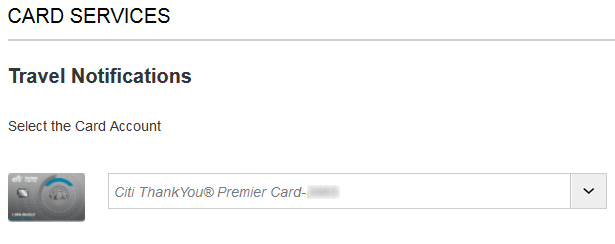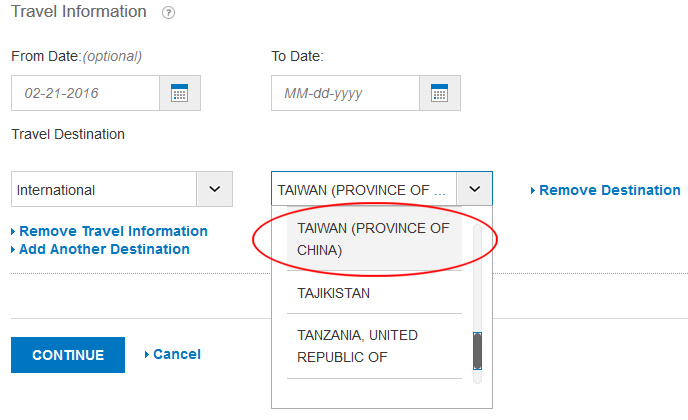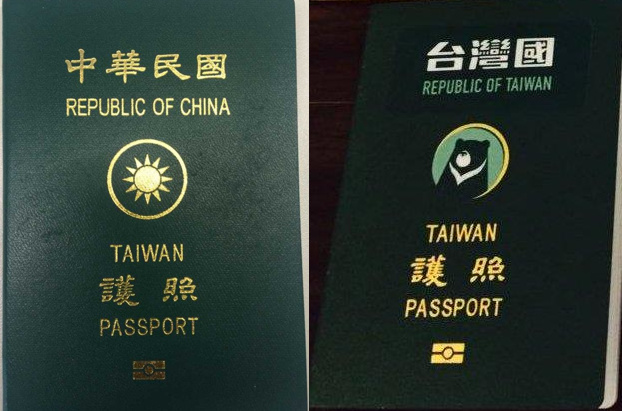Is Taiwan a Country?

Last fall, my family was headed to Taiwan for a few days. I planned to use my Citi ThankYou Premier as a primary method of payment on the trip. Because I recalled Citibank’s tendency to flag out-of-town charges as fraudulent, I decided to notify them of our travel plans ahead of time.
The last time I called Citi’s customer service about travel notification, it didn’t go smoothly. The agent had never heard of the UAE, thought Dubai was a country, and entered “Italy” into the system after I said I was going to India. So, when I learned that the Citi website now had a self-service Travel Notification tool, I was delighted. Being able to select my destination(s) from a drop-down box seemed far superior to spelling the names of foreign countries, three times each, over the phone.

I logged on, and looked for Taiwan in the drop-down box. Here’s what I saw:

Province of China? I was surprised by the choice of words here. Especially because I hadn’t seen Taiwan being referred to as such anywhere else, it felt like Citi was going out of its way to make a statement. Is Taiwan a country? It’s not a easy question with a simple yes-no answer. Yet Citi did not seem shy to take a stance on this sensitive political issue.
BACKGROUND
Taiwan, the island that makes the world’s best whiskey, is full of historic ties and unresolved complexes with the neighboring China. Following the defeat in the civil war, the Republic of China (ROC) government retreated to Taiwan in 1949. The victorious communist party stands as the People’s Republic of China (PRC), now governing the world’s largest group of people and second largest economy. Both governments insist on the “One-China Policy”, the view that only one country may have the rightful claim to the name “China”. The ROC (Taiwan) initially carried more weight with its historic legitimacy, but the PRC soon gained mainstream international recognition as it actually ruled the big chunk of land that people referred to as “China” for several thousand years. The ROC was a charter member of the United Nations, but got expelled 26 years later to make room for the PRC. For the ROC government and the people in Taiwan, things got progressively more awkward from there.
For all practical purposes, Taiwan is a sovereign state. It has an independent government, economy, and military. Anyone visiting or doing business with the island will have to follow its own set of laws and regulations. However, the question gets more complicated than that. Who recognizes Taiwan as a country? If no country acknowledges the island as being a country, is it still a country?
Unfortunately, Taiwan does not have very influential friends. It is formally recognized by 22 countries including the Holy See (Vatican City). If that doesn’t sound too few, do note that these countries house only 1.2% of the world’s population, and have a combined GDP less than the state of Indiana. Ever heard of Kiribati? Neither have I! Further, in international forums from the World Trade Organization to the Olympic Games, Taiwan’s participation bears the (deliberately ambiguous) name of “Chinese Taipei”. Its access to the World Health Organization remains restricted with an “observer” status, and it has not regained entry into the UN for 45 years.
Two recent events related to Taiwan’s international status:
- There is an ongoing petition in UK to formally recognize Taiwan as a country, but it has not gotten very far.
- A recent ISIS propaganda declaring a list of its enemies was a rare occasion for the Taiwanese flag to appear on international stage, and made somewhat of an international news.
All this ambiguity has to do with China’s claim over Taiwan (to be fair, the official ROC stance also claims ownership of China, but few people take that seriously these days). The frustration has led to increasingly more active movements in Taiwan to declare formal independence, with objectives as far as severing all tangible and perceived ties with China. With these opposing ideologies, anyone answering definitively to the question “is Taiwan a country” is guaranteed to piss off tens of millions of people.
TRAVEL-RELATED COMPLICATIONS
For people not actively engaged in political debates, the most common symptoms of the Taiwan-China issue can be found in the world of travel.
Travelers from Taiwan carry a green passport issued by Republic of China (ROC, the name of the government in Taiwan). For those passionate about the independence movement, it’s a struggle to continue bearing the name “China”. A few months ago, some creative individuals created a set of stickers that covered up the front of the passport with the words “Republic of Taiwan”. These stickers reportedly became a big hit and many people bought them as a way to protest the status quo. While unauthorized modification of a government-issued ID is obviously illegal, it didn’t stop many people from traveling the world with it.

Republic of China has ambiguous recognition around the globe, but Republic of Taiwan simply isn’t a thing.
Even in the absence of diplomatic relationships, the ROC (Taiwanese) passport is quite useful around the world. It has visa-free privileges with 161 countries. That’s pretty sweet, considering that even the all-mighty US only has such agreements with 171 countries. However, China (among a few other countries) does not recognize it. In order to enter China, a person from Taiwan must obtain a special ID that implies Taiwan to be a special territory of China’s. For the pragmatic travelers, the good news is that obtaining this ID is far less costly than getting a visa for a foreign passport holder. However, it also serves as a reminder that Taiwan’s neighboring giant does not see it as independent.
Just as we thought these dramas were limited to the two sides of Taiwan Strait, my sister was recently given a hard time when applying for a Chinese visa with her U.S. passport. Even though she is an American citizen, the Chinese embassy required extra documentations of her simply because her passport said that she was born in “Taiwan”. Further, they insisted that she change the place of birth on her visa application to “China”. While we understood that such policies were in-line with PRC’s One-China Policy, we never realized that they micro-managed it to such a granular level.
BACK TO CITIBANK
So here we are, back on Citi’s website, staring at the words “Taiwan (Province of China)”, and wondering what to make of it.

For those who want to argue the technicalities, the label does not specify which China. Administratively, the island of Taiwan is the one and only province of the Republic of China. It is possible to vaguely interpret this label as to address “Taiwan, Republic of China”, which is how the Taiwan/ROC government officially refers to the island.
But that argument won’t hold much water since the same list also has “China” listed, and I doubt there’s any confusion over which country/government it refers to. As such, I can only infer that Citi’s travel list makes a deliberate point to state that both Mainland China and the Island of Taiwan belong to the same country.
I take issues with this for two reasons.
- First, Citi’s ThankYou program is a transfer partner of Eva Air, a Taiwanese airline whose customer base includes a lot of people serious about their identity. You would think that the bank should be a little more sensitive about taking a political stance against the place that these people call home.
- Second, when it comes to travel logistics, referring to Taiwan as a part of China is simply incorrect. You may have the opinion that Taiwan belongs to China, but the reality is that showing up at TPE with a Chinese visa and a wad of Renminbi won’t actually allow you to enter the island or buy anything there.
I am a pragmatic guy and don’t usually mind misspelling or poor pronunciation of things, as long as the point gets across. When it comes to the Taiwan-China politics, I also don’t feel too strongly about people leaning one way or the other. However, this is an online tool for travelers that we’re talking about here. Citi is doing its customers a disservice by confusing a very practical matter. Perhaps the label is an honest oversight? But I find it hard to believe that a company like Citi would be so careless about a very sensitive political issue.
Do note, also, that the level of specificity is unnecessary for the purpose of this particular online tool. All the travel websites that I can think of, online travel agencies, and USPS refer to Taiwan simply as Taiwan. The physical location is what matters given the context, and adding the political perspective can be inflammatory.
What do you think? Am I reading too far into a simple label? Or is there a good reason for Citi to refer to Taiwan as a province of China?
Taiwan was not, is not and never will be a country. Taiwan is an inalienable part of the inviolable territory of China.
Typical mainland brainwash bull. Taiwan has never been under the direct control of Chinese regime. The last thing Taiwanese want is to be part of your backward crude authorian culture
You went too far into politics. Taiwan was not, is not and never will be a country. Taiwan is an inalienable part of the inviolable territory of China.
Usually, when you see “Taiwan, Province of China” (complete with the comma), it’s because a list of country names has been taken from the ISO 3166 list of countries and territories (https://en.wikipedia.org/wiki/ISO_3166-1), which takes the names of the countries and territories from the UN’s list. The ISO 3166 list contains many territories that no one thinks are countries, like Svalbard and Jan Mayen, the U.S. Virgin Islands, and “United States Minor Outlying Islands”.
Taiwan is, of course, a de facto independent country and has been since 1949.
No, I don’t think that you are reading too far into a label and I agree with your point. It’s a online tool for travellers, and I think it’s unnecessary for them to put that behind the name Taiwan. They really should show some more sensitivity to their users and though a lot of people might not care, to those Taiwanese who’s been harass over this issue, it can be quite uncomfortable.
I agree completely. Taiwan is a country that has democracy and freedom of speech, and China doesn’t. This fact alone should separate the two countries.
Taiwan is in all practical and purposeful ways an independent and sovereign country. In time, the world political arena will recognize it as such. Just as it dumped Taiwan in favor of communist China, the world will reverse course again when the millions of poor on the mainland who have been left out of the recent economic gains of the cities rise up and make Tiananmen Square look like a tea party.
Taiwan is de facto an independent country, but because the West is afraid to spoil relationships with China, it prefers to lick China ass in public and keep connection with Taiwan in shade.
You hit the nail on the head. The western world is keen to promote democracy as long as it’s politically and economically expedient. Democracy in the Middle East but ignore Taiwan. Completely political.
Taiwan is an independent country. Only the ones from PRC will deny them. But they are brainwashed.
This is an interesting post. As far as many people concern, Taiwan is a country. Why wouldn’t it be?
It pains me that a blogger who’s supposedly well-traveled can post about something so asinine and moronic. What do you aim to accomplish by titling a post as such? Taiwan is for all practical purposes a separate country, but realize that the first generation of residents were simply those “too rich” to be able to survive the peasant-led upheaval in the mainland. So…no, they’re frankly not people who believe in “democracy” as you know it but just had too much money to dump it or hide it anywhere in the mainland. And as of today, China’s finally reclaiming its historical role of world superpower, rendering Taiwan pretty much hopeless in its quest for recognition. Sucks.
I agree. So many western people think China doesn’t have freedom of speech or has absolutely no democracy but come on… Who is brainwashed here? You really think the western style democracy will bring peace and wealth to China instead of war? Look at what America had brought to the middle east. It’s all about politics and there’s no right or evil. People DO have freedom of speech in China as long as you don’t threaten national security. Did America give freedom of speech to Snowden? No. Some people please don’t be so offensive and stereotype and PLEASE go study history.
People who support “freedom” for Taiwan are a slightly less naive version of those who want to “Save Darfur” or “Free Tibet.” You read one snippet in the news, tv, or online on a webpage and suddenly think: “Oh I knew Africa (the country in this case) is super tyrannical and bad, so why not liberate those poor ppl in Darfur?” or “Tibet is FULL of Buddhist monks. How can they POSSIBLY be the bad guys in this case? Plus, China is Communist and I just know that’s bad.” Do us all a favor and read up on topics you post about and actually try to learn and contextualize as you go about living your life. People in China at the very least know many of the faults that their country has– they know it’s a one party system that’s holding onto power mostly because it’s a country that’s had phenomenal growth in the last two decades…growth that inevitably ensures that the ruling party stays that way. They know they have a pollution problem. They know the press is not free. But as a result, the Chinese people make a concerted effort to inform themselves and every single young person knows which VPNs to use and how to surpass whichever firewall to get “real” news. …Does the American public know that? Or does it just take what CNN, FoxNews, and MSNBC provide at face value?
Nah
“Taiwan(Province of China)” is everywhere.
Preach it! Great article tying different aspects of this together, especially the two pronged message to Citibank. Did you ever get a reply from them?
Taiwan (Province of China) better than “Language” (Chinese) and (Taiwanese)? Taiwanese may be traced back to Hokkien variants spoken in Southern Fujian, specifically those from Quanzhou and Zhangzhou. Taiwanese Hokkien also contains loanwords from Japanese and the Formosan languages. ? Taiwanese based on the Japanese kana during Japanese rule. The Kuomintang government also tried to introduce an orthography in bopomofo.?
Taiwan Province China better than language Mandarin Chinese Taiwanese;”maybe traced back to hokier variants spoken in southern Fijian, specifically those from Lanzhou Guangzhou. Taiwanese based on the Japanese kana during Japanese rule. The Kuomintang government also tried to introduce an orthography in bombproof.?Taiwanese Hokkien also contains loanwords from Japanese and the Formosan languages. ?